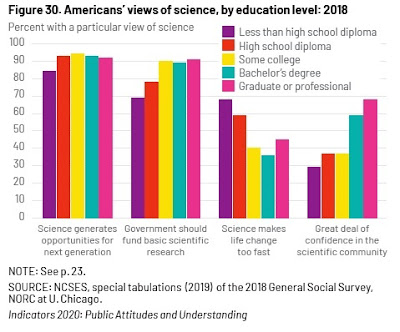One tension of modern life is that we love new technology when it makes our lives easier, more fun, safer, or healthier, but we hate new technology when certain familiar skills, accustomed habits, favorite consumables and even our jobs become outdated--and we are forced to change. So how do Americans view science overall?
Here are a couple of figures from The State of U.S. Science and Engineering 2020, by Beethika Khan, Carol Robbins, and Abigail Okrent, just published by the National Science Foundation and the National Science Board (January 2020).
This figure shows responses to four questions. There is 80+% agreement that the US government should fund basic research, and 90% agreement that science generates opportunities for the next generation, and both sentiments seem to have risen a bit in the last 20 years. On the other side, about 50% of Americans say that "science makes life change too fast" and less than 50% "have a great deal of confidence in the scientific community."
One might sum this up by saying that Americans recognize the importance of science in the abstract, but when it comes down to their own daily lives or to actual scientists, they are more skeptical.
Another figure shows a breakdown by education level to these questions. The results are mostly predictable: that is, more education generally makes you more likely to believe science is important, to support government funding for science, and to express confidence in scientists.

But it's interesting to note on the question of whether "science makes life change too fast," the skepticism for those with graduate or professional degrees is higher than for those with some college or a bachelor's degree.
I have my days and times, like everyone else, when new technology adds stress to my life. I feel a lot of sympathy for people whose employers or jobs are eliminated with the arrival of new technology. But from a broad social point of view, embracing the new opportunities of science and technology is extraordinarily important. Issues ranging from better-paid jobs, effective health care at moderate cost, widespread access to education and training, environmental protection, and many other desirable outcomes are much more likely to be achieved if science and technology keep moving forward in useful directions. Also, many other nations and workforces around the rest of the world want science and technology to make life change even faster, and they are moving in that direction.
A version of this article first appeared here.





Leave your comments
Post comment as a guest